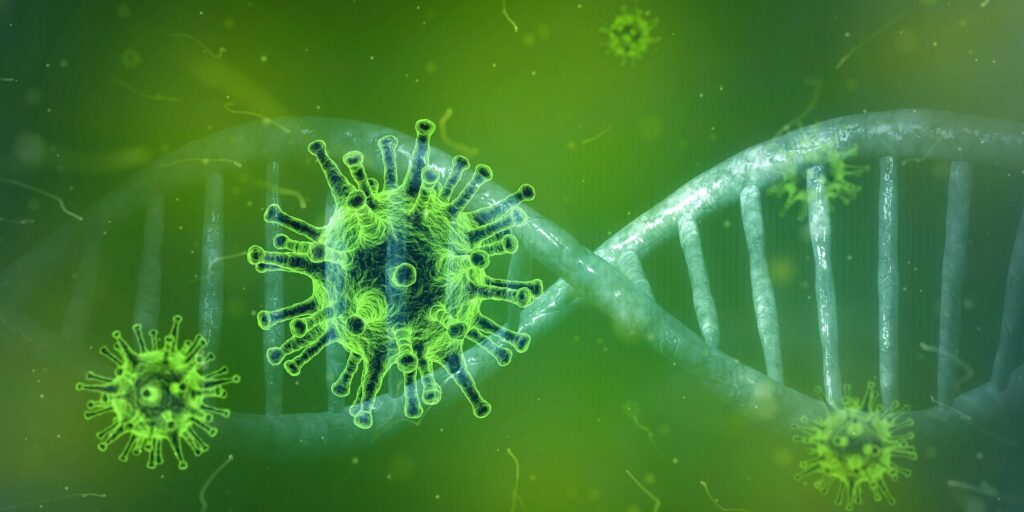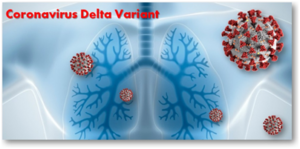Slow mutation of the Novel coronavirus helping vaccine development easier

Dr. Shuvomoy Banerjee, Neucrad Health July 8, 2020
A very recent research work from Johns Hopkins University has given some hope amidst the growing Covid-19 infection worldwide. Their study has revealed that the rate of mutation of the novel coronavirus is very low. As a result, the virus is not able to create its new variants very quickly. This is good news for medical scientists, researchers and the general public as they need time to develop the effective vaccine candidate for this deadly virus.
Before discussing the scientific observation in detail, let’s take a look about mutations and their relationship with viruses.
Mutation:
DNA (deoxyribonucleic acid) is found inside the nucleus of cells in the body of animals and plants. RNA (ribonucleic acid) is made from this DNA. Although, RNA is made in the nucleus by transcription process and transferred to the cytoplasm later. Proteins are made by translation from mature RNA. The total process is designated as-“Central Dogma”. Proteins are very crucial because they perform the most important cellular functions. Both DNA and RNA are made up with numerous nucleotide sequences. Therefore, the sequence controls the genetic character of an organism. Interestingly, some parts of nucleotide sequence in DNA are responsible for generating functional proteins. This sequence is called ‘Gene’. In viruses, the genetic material may be DNA or RNA. When there is a change in the nucleotide sequence of these genes for various reasons, the structural and functional changes in the viral protein occur. This phenomenon is called mutation. There are many types of mutations. Some mutations are progressive to the evolution of organisms and some mutations are antithetical.
According to Charles Darwin’s natural selection theory, viruses continue to evolve. This is because of the subtle genetic changes of the virus genome sequence and again the large genetic changes. In scientific terms, the first is called ‘mutation’ and the second one is ‘recombination’. This recombination phenomenon is different from mutations, because the exchange and recombination of genetic information between two viruses gives birth of a novel virus.

Mutation in Novel coronavirus:
In other viral diseases, such as Influenza, the rate of gene mutations in the virus is very high. As a result, Influenza virus rapidly changes its character. So, it is hard to make such vaccines easily. Novel coronavirus does not currently have this problem. Of note, mutations are occurring in the SARS-CoV-2 at a much slower rate. The rate of genetic mutations is so low that new variants of this virus cannot be created. Dr. Winston Timp and Dr. Stuart Ray, scientists at Johns Hopkins University’s Viral Genomics Project, informed an interesting fact. According to them, since no immunity against the novel coronavirus has been developed yet, the virus doesn’t have any evolutionary pressure on it to create new variants for spreading the infection. However, scientists have developed the ‘Covid-19 Research Response Program’ to properly analyze and monitor the corona situation which will help to review how much immunity is developing in human population worldwide against the novel coronavirus. Scientists hope that in this case, slow mutation will help them to develop a suitable vaccine from the virus’s protein in time.

References:
- Jia Y, Shen G, Zhang Y, Huang K-S, Ho H-Y, et al. 2020 Analysis of the mutation dynamics of SARS-CoV-2 reveals the spread history and emergence of RBD mutant with lower ACE2 binding affinity. bioRxiv10.1101/2020.04.09.034942
- Pachetti M, Marini B, Benedetti F, Giudici F, Mauro E, et al. Emerging SARS-CoV-2 mutation hot spots include a novel RNA-dependent-RNA polymerase variant. J. Translat. Med. 2020;18:179. doi: 10.1186/s12967-020-02344-6
- https://www.sciencemag.org/news/2020/03/mutations-can-reveal-how-coronavirus-moves-they-re-easy-overinterpret
- Zhao, Z., Li, H., Wu, X. et al. Moderate mutation rate in the SARS coronavirus genome and its implications. BMC Evol Biol 4, 21 (2004). https://doi.org/10.1186/1471-2148-4-21
- https://www.nature.com/scitable/topicpage/genetic-mutation-1127/
- Fleischmann WR Jr. Viral Genetics. In: Baron S, editor. Medical Microbiology. 4th edition. Galveston (TX): University of Texas Medical Branch at Galveston; 1996. Chapter 43. Available from: https://www.ncbi.nlm.nih.gov/books/NBK8439/










